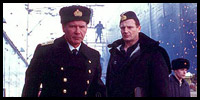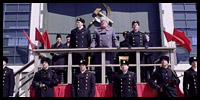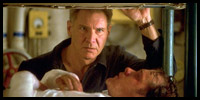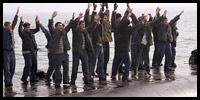
 |
K-19: The Widowmaker (2002) Directed by Kathryn Bigelow Cast: Harrison Ford, Liam Neeson, Joss Ackland, Peter Sarsgaard, Christian Camargo, John Shrapnel, Tim Woodward, Tygh Runyan, Sam Redford, Sam Spruell 2002 – 138 minutes Rated: Reviewed by Dustin Putman, July 19, 2002.  1981's "Das Boot" and, more recently, 1995's "Crimson Tide" and 2000's "U-571," gave the public what was thought to be the final word on submarine-set thrillers. Judging by the uninteresting, cliched ads for "K-19: The Widowmaker," the film's initial outlook seemed bleak. After all, when based in reality and limited to such confined spaces and props, there is only so much that can be done in the genre before it unavoidably feels like it is just going through the motions.
1981's "Das Boot" and, more recently, 1995's "Crimson Tide" and 2000's "U-571," gave the public what was thought to be the final word on submarine-set thrillers. Judging by the uninteresting, cliched ads for "K-19: The Widowmaker," the film's initial outlook seemed bleak. After all, when based in reality and limited to such confined spaces and props, there is only so much that can be done in the genre before it unavoidably feels like it is just going through the motions.
The ill-conceived trailers only got half of the equation right. Subjectively, "K-19: The Widowmaker" offers nothing particularly fresh, insightful, or that the average action moviegoer hasn't seen before. Where the motion picture excels enough to surprisingly be worth a look, then, is in the delivery. Produced and directed by Kathryn Bigelow (1995's "Strange Days"), "K-19" is a skillfully made suspenser that, at times, raises the tension levels to such lofty heights as to make you want to hold your breath in dreaded anticipation.  Set in 1961 during the unveiling of Russia's first nuclear ballistic submarine, Captain Mikhail Polenin (Liam Neeson) is disappointed when his rank is downgraded to Executive Officer in favor of the hard-working, if rough-edged, Alexi Vostrikov (Harrison Ford). Before the submarine even leaves port, it is nicknamed the "Widowmaker" after ten crew members are killed in various accidents. Further spelling out doom is the USSR's rush to begin their mission in hopes of stopping America's suspected first strike. In doing so, they have overlooked the fleet's systems, which are still in the testing phase. If a single thing goes wrong that cannot be fixed, it could lead to a catastrophic nuclear war.
Set in 1961 during the unveiling of Russia's first nuclear ballistic submarine, Captain Mikhail Polenin (Liam Neeson) is disappointed when his rank is downgraded to Executive Officer in favor of the hard-working, if rough-edged, Alexi Vostrikov (Harrison Ford). Before the submarine even leaves port, it is nicknamed the "Widowmaker" after ten crew members are killed in various accidents. Further spelling out doom is the USSR's rush to begin their mission in hopes of stopping America's suspected first strike. In doing so, they have overlooked the fleet's systems, which are still in the testing phase. If a single thing goes wrong that cannot be fixed, it could lead to a catastrophic nuclear war.
 The journey begins with Vostrikov constantly testing his somewhat inexperienced men with practice drills at the onset, as well as pushing the limits of the sub as he orders for it to travel to crush depth. Predictably, the real problems are triggered soon after. When the boat's nuclear reactor springs a leak, two men at ten-minute intervals must expose themselves to life-threatening radiation in an attempt to patch it up. As the radiation spreads among the ship's men and some grow deathly ill, Vostrikov must decide what is most important: to salvage his pride and risk the lives of everyone on board, or seek American assistance.
The journey begins with Vostrikov constantly testing his somewhat inexperienced men with practice drills at the onset, as well as pushing the limits of the sub as he orders for it to travel to crush depth. Predictably, the real problems are triggered soon after. When the boat's nuclear reactor springs a leak, two men at ten-minute intervals must expose themselves to life-threatening radiation in an attempt to patch it up. As the radiation spreads among the ship's men and some grow deathly ill, Vostrikov must decide what is most important: to salvage his pride and risk the lives of everyone on board, or seek American assistance.
 The first half of "K-19: The Widowmaker" sets up both the premise and the uncomfortable relationship that immediately forms between Vostrikov and Polenin. While there is a taut moment or two, particularly a set-piece involving the lengths Vostrikov goes to to prove the stability of the submarine, little is offered that is thoroughly absorbing. One suspects director Kathryn Bigelow is biding her time in preparation for a showstopping second hour—and she is.
The first half of "K-19: The Widowmaker" sets up both the premise and the uncomfortable relationship that immediately forms between Vostrikov and Polenin. While there is a taut moment or two, particularly a set-piece involving the lengths Vostrikov goes to to prove the stability of the submarine, little is offered that is thoroughly absorbing. One suspects director Kathryn Bigelow is biding her time in preparation for a showstopping second hour—and she is.
With almost no physical action or violence, Bigelow ratchets up an overwhelming aura of apprehension through the tightly wound and increasingly calamitous plot developments. Aided by editor Walter Murch (1999's "The Talented Mr. Ripley"), the film's deliberately slow pace takes the form of what only seems like an action-packed spectacle due to the level of sheer suspense that evolves. The results of the men risking their lives in the line of duty by exposing themselves to the radiation is cause for some ghastly, uncompromising images.  Harrison Ford (2000's "What Lies Beneath") and Liam Neeson (1999's "The Haunting") deliver commendable performances that do not upstage each other. As Vostrikov, Ford has taken up a believable Russian accent to portray a character who is quite a departure from his "good guy" roles. While Vostrikov becomes heroic by film's end, his smarmy, demanding attitude at the onset leaves you curious as to who this man really is. As the by-the-books, well-liked Polenin, Neeson is every bit as good, effectively playing a Captain who grows resentful when his standing is taken away from him, but refuses to show it. Polenin understands it is his job, no matter the rank, and the fate of his country (and his crew) is what really matters. The other men onboard the sub, regretfully, never rise above one dimension as they are painted with, at most, a single defining characteristic.
Harrison Ford (2000's "What Lies Beneath") and Liam Neeson (1999's "The Haunting") deliver commendable performances that do not upstage each other. As Vostrikov, Ford has taken up a believable Russian accent to portray a character who is quite a departure from his "good guy" roles. While Vostrikov becomes heroic by film's end, his smarmy, demanding attitude at the onset leaves you curious as to who this man really is. As the by-the-books, well-liked Polenin, Neeson is every bit as good, effectively playing a Captain who grows resentful when his standing is taken away from him, but refuses to show it. Polenin understands it is his job, no matter the rank, and the fate of his country (and his crew) is what really matters. The other men onboard the sub, regretfully, never rise above one dimension as they are painted with, at most, a single defining characteristic. If the off-puttingly titled "K-19: The Widowmaker" succeeds in mostly keeping the viewer involved in the characters' plight for the first two hours, the unnecessary 15-minute denouement (set in 1989) takes far too long to say so little. As with the problematic wraparound segments in 1998's "Saving Private Ryan" and 1999's "The Green Mile," screenwriter Christopher Kyle exposes a needlessly contrived, self-important master plan that fails to pay off emotionally or otherwise. Still, if you have the patience to wallow through these final scenes, "K-19: The Widowmaker" is exciting enough for the majority of its 138-minute running time to make for, at the least, a marginally arresting cinematic experience.
If the off-puttingly titled "K-19: The Widowmaker" succeeds in mostly keeping the viewer involved in the characters' plight for the first two hours, the unnecessary 15-minute denouement (set in 1989) takes far too long to say so little. As with the problematic wraparound segments in 1998's "Saving Private Ryan" and 1999's "The Green Mile," screenwriter Christopher Kyle exposes a needlessly contrived, self-important master plan that fails to pay off emotionally or otherwise. Still, if you have the patience to wallow through these final scenes, "K-19: The Widowmaker" is exciting enough for the majority of its 138-minute running time to make for, at the least, a marginally arresting cinematic experience.
©2002 by Dustin Putman |
 |













